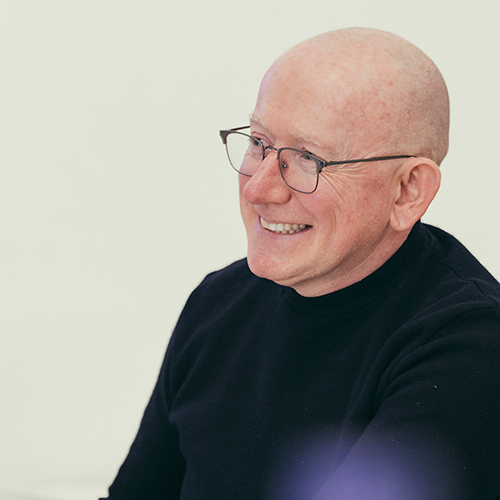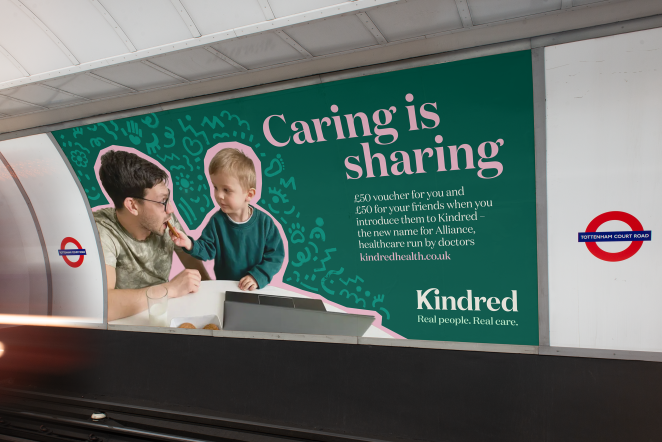When needing to see a healthcare professional, we generally feel like we are in safer hands with a ‘specialist’ than our general practitioner. The term denotes expertise in a particular subject, and a high degree of skill. Simon Case, Creative Director at Chromatic, believes that vertical sector expertise is just as important when building a business and a reputation, but that looking across the business and social landscape ensures the specialism stays relevant and continues to lead the category.
Simon explains why combining sector speciality combined with a view of the bigger picture is vital, and why strategic and creative advisors should be prized for breadth of experience, lessons learned from a variety of industries, and the ability to approach a project holistically to apply joined up thinking for aligned brand identity, expression, and execution.

There are many areas of business - healthcare being a prime example, brand identity another - where we seek the advice of specialists.
The term denotes a depth of expertise in a particular sector or discipline and a high degree of skill that will ensure best in class results. However, not all specialists are created equal. When a client goes looking for an ‘expert’ that has no experience in the sector then that client is looking for new thinking; they want to break through the category norms.
So remaining fresh and relevant often requires us to look beyond our specialism - or at the very least, ensure our specialism isn’t determining the solution, the business challenge is. Therefore the best specialists will look at a situation holistically before delivering their specialist point of view.
When it comes to brand strategy and design, this could not be more important. Vertical sector expertise is deeply important when building a business and a reputation, but looking across the business and social landscape ensures the specialism stays relevant and continues to lead the category.

The challenge that we as creatives face is that different clients have differing needs and at different stages of their brand journey. Sometimes it’s evolution not revolution. Sometimes it's understanding your customers a little better. Sometimes the brand purpose isn’t the problem, it’s the messaging.
Being able to combine a broad range of sector experience and creative skill with brand and customer insight helps us unlock the real opportunity for our clients. However, once a clients’ opportunity has been identified, being a specialist ensures world class execution and results.
Taking a holistic, integrated approach
On the one hand, different client jobs require varying talents, crafts and experiences, so you must be able to apply a broad understanding of the market in order to be able to bring in the right mix of tools and people to help with the brief.
Our recent work with corporate medical insurance company Alliance Health Group (AHG) to launch their new direct to consumer offering Kindred Health and step into the UK’s ever-growing private health insurance market after 20 years of B2B operations is a case in point.

Following initial activity to help AHG define the consumer market opportunity and align on strategy, proposition, name, identity and subsequent launch for the new brand, there is now a greater requirement for a far more integrated approach to the campaign which incorporates PR, experiential and out of home activity. Knowing how to move out of our own areas of specialty to bring in those additional areas of expertise is a strong service offering.
Zoning in on a client niche
On the other hand, you have to be a specialist in your client’s area of business if you are to have any credibility and be able to speak the language they speak. This is particularly important for B2B work.
Some sectors such as financial services and technology are highly defined and demand a significant level of technical knowledge and expertise simply to be able to contribute to the conversation. The language can be so arcane and technical that an understanding of the business sector is essential to be able to translate and then communicate what makes the client’s business unique or special.
Moreover, the high value contracts at stake in the B2B world, with values into the multi millions, mean that helping a client make that connection with customers who are considering making enormous purchases is more important than ever.

It’s therefore vital to be able to explain the technicalities of what a client does in order to convey their relevance and value and help move that decision-making process along. Whether working with a SaaS solution provider or insurance brand, you need to be able to understand their language and lexicons and to articulate them in a way that resonates with the client and its audience.
Specialism in industry verticals then, particularly when trying to build consultancy credibility, is very important. For smaller agencies, being able to claim a niche based on deep understanding is a big competitive differentiator. And those pockets of specialism will often provide the springboard to launch into other sectors and build the business one vertical at a time - all the while contributing to the more ‘generalist’ benefit of breadth of experience in multiple sectors that underpins more specialist insight.
Specialists that understand the bigger picture
The key to this balancing act of generalism and specialism then is the ability to combine general marketing and brand savvy-ness with sector specialism to meet client needs on all fronts. For this, an understanding of the bigger picture for clients, of their business challenges, where they are in their journey as a brand, and how to help them achieve their objectives, is fundamental. It’s not just about how to deliver a campaign.
Breadth of experience, lessons learned from a variety of industries, and the ability to approach a project holistically to apply joined up thinking for aligned brand identity, expression and execution is key, but it must also be backed up by real, in-depth sector knowledge in order to be able to effectively tell their story and make them relatable to their target audience and industry.






